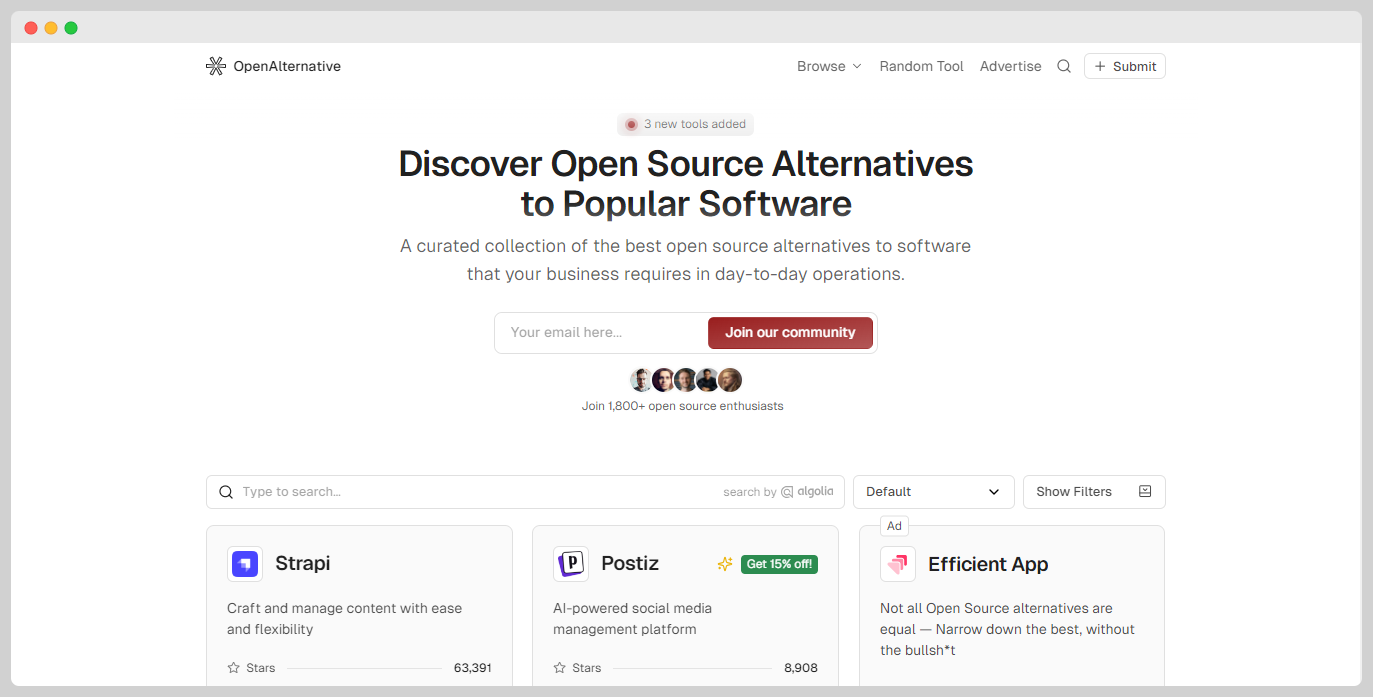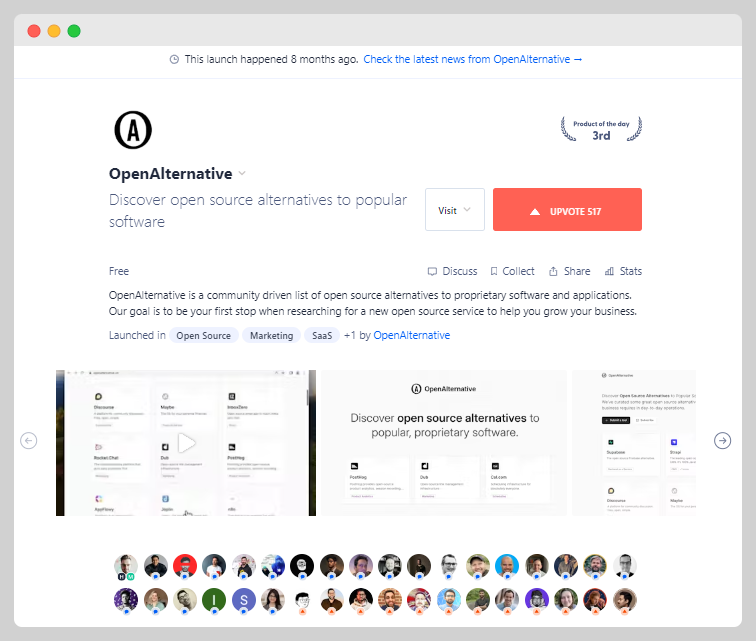How a Weekend Project Hit 100k Users: Open Source Success
Who is Piotr Kulpiński?🔗
Piotr Kulpiński, the founder of OpenAlternative, is a software developer and entrepreneur from Poland with over 15 years of experience building web applications, and he has a strong passion for open-source software and community contribution.
What problem does OpenAlternative solve?🔗
OpenAlternative helps people find reliable, community-backed open-source software alternatives, saving them money and freeing them from proprietary software constraints.

How did Piotr come up with the idea for OpenAlternative?🔗
The idea for OpenAlternative emerged from a blend of personal interest and curiosity. As a software engineer with a keen interest in open-source software, the founder had been compiling a list of open-source projects for personal use. Recognizing the potential to benefit others, they decided to share this list more broadly. Their motivation was partly driven by a desire to contribute back to the open-source community and explore new technologies like SEO and growth strategies.
To validate the idea, they began by curating high-quality open-source projects, carefully choosing ones that were popular, useful, and actively maintained. The constraints of a quick project timeline also played a role in shaping the initial simple features of the site. After assembling about 70 projects, they took the valuable step of building a minimal site in just 48 hours to test the waters.
In refining the idea, they integrated data from GitHub to provide additional insights and leveraged programmatic SEO to enhance discoverability. Through this process, they confronted challenges such as limited query capabilities of Airtable, which they overcame by using a middleware service. This journey taught the founder the importance of quality curation, listening to community feedback, and the potential of programmatic SEO, ultimately leading to the creation of a valuable resource for those searching for open-source alternatives.
How did Piotr build the initial version of OpenAlternative?🔗
Piotr Kulpiński built OpenAlternative within a 48-hour timeframe, choosing to keep the initial product simple with no search or filtering features. He utilized Astro for the front-end development, which allowed him to experiment with a new framework while saving on hosting costs. For the backend, he utilized Airtable as a database and leveraged a middleware service to convert Airtable’s API into a GraphQL API to enhance data querying flexibility. To enrich the platform's functionality, he built a Cloudflare Worker to pull GitHub API data, such as stars and forks, which was integral to generating content for programmatic SEO. The development process, completed in about 12 hours, was fast-paced and challenging yet benefited from Piotr's previous coding experience and code reuse across projects.
What were the initial startup costs for OpenAlternative?🔗
- Domain Registration: The domain openalternative.co was registered for $6.99.
How did Piotr launch OpenAlternative and get initial traction?🔗
Twitter Promotion🔗
The founder of OpenAlternative began by sharing the website on Twitter. Despite having only 900 followers, the Twitter post garnered unexpected attention. Engaging with followers and industry influencers played a crucial role, as this led to a significant boost in traffic after Steven Tey, a well-known figure, shared the project with his audience.
Why it worked: The Twitter strategy worked well because it utilized existing connections and the power of influencer sharing. Even a small audience can lead to substantial exposure when the right person amplifies the message.
Product Hunt Launch🔗
Building on the momentum from Twitter, OpenAlternative was launched on Product Hunt. The founder built further awareness by adding a custom Product Hunt banner to the site and sharing the post on Twitter and LinkedIn. The collective effort helped OpenAlternative secure 3rd place on the launch day with over 500 upvotes.
Why it worked: Product Hunt provided a platform for tech-savvy users who were interested in innovative projects. The use of a banner on the site ensured that ongoing visitors were aware of the Product Hunt launch, which contributed to the upvotes.
Hacker News Submission🔗
The founder submitted OpenAlternative to Hacker News, where the community immediately took an interest in the project. The submission quickly reached the front page and eventually climbed to #1, resulting in a massive influx of visitors.
Why it worked: Hacker News was a perfect fit due to the nature of the audience, which values open-source projects and innovative tech solutions. The community engagement on Hacker News generated substantial trust and curiosity, driving considerable traffic.
Reddit Engagement🔗
Concurrently, OpenAlternative was promoted on Reddit in specific subreddits like r/SelfHosted. The post received positive feedback initially, with over 250 upvotes. However, an attempt to monetize the traffic with a $97 feature fee backfired, resulting in negative feedback and the removal of the post.
Why it worked: Despite the monetization misstep, Reddit successfully brought in meaningful traffic and feedback due to its focus on niche communities interested in open-source alternatives. The active engagement helped raise awareness and provided insights directly from potential users.
Metrics:
- 100,000 unique visitors in the first week.
- Over 500 upvotes on Product Hunt.
- #1 spot on Hacker News for several hours.
- 250 upvotes on r/SelfHosted initially before removal.
What was the growth strategy for OpenAlternative and how did they scale?🔗
Hacker News🔗
OpenAlternative received significant visibility through Hacker News. After posting on the platform, it quickly climbed to the #1 spot, gaining over 150 upvotes and maintaining its position on the front page for several hours. This exposure resulted in thousands of visitors every hour, significantly boosting site traffic.
Why it worked: Hacker News is widely frequented by tech-savvy users interested in open source projects. The platform's community is well-aligned with the site’s mission of promoting open source alternatives, making it a perfect fit. The immediate interest and engagement on Hacker News demonstrate its effectiveness in driving relevant and substantial traffic.
Product Hunt🔗
Another key growth channel was Product Hunt. OpenAlternative was posted here following the initial launch success. The post garnered over 500 upvotes and achieved 3rd place on the day of its launch, which further expanded its reach.

Why it worked: Product Hunt is a popular platform for discovering new tech products, providing a large audience with an inherent interest in innovative projects. The exposure on Product Hunt not only increased traffic but also attracted a community that could provide valuable feedback and support.
Twitter🔗
The founder initially shared OpenAlternative on Twitter, which, despite having a modest follower base, managed to capture interest. A significant boost came when someone with a larger audience shared the project, generating more traffic to the site.
Why it worked: Twitter's ability to amplify content through shares and engagement can help projects reach wider audiences beyond the initial follower base. Influential users sharing content can create ripple effects, quickly increasing visibility and driving significant traffic.
SEO and GitHub Integration🔗
OpenAlternative leveraged Programmatic SEO by generating numerous pages for Google to index, using data from GitHub to enrich the content. By targeting competitive keywords like “open source alternatives,” it began to rank well, driving organic search traffic.
Why it worked: The strategic use of SEO focuses on maximizing visibility for search engines, capturing traffic from users proactively seeking open source alternatives. GitHub data integration ensured that the content was both informative and dynamic, aligning with user search intents and boosting engagement.
What's the pricing strategy for OpenAlternative?🔗
OpenAlternative's product listings are free, with a temporary monetization attempt involving a $97 fee to feature projects, which was quickly retracted due to user backlash.
What were the biggest lessons learned from building OpenAlternative?🔗
- Embrace Rapid Experimentation: Building OpenAlternative in just 48 hours forced a focus on core features and helped test viability quickly, which is crucial for learning what works.
- Community Engagement is Key: Leveraging platforms like Twitter, Product Hunt, and Hacker News drove significant initial traffic and feedback. Engaging with communities that resonate with your product can provide invaluable exposure and insights.
- Iterate Based on Feedback: Mistakes like attempting to monetize too early were corrected swiftly based on user feedback. Listening to your audience can help refine your product and approach.
- Leverage Strategic Partnerships: Benefiting from a retweet by a prominent figure expanded reach and visibility. Building relationships and leveraging networks can amplify your launch.
- Adaptability Fuels Success: Transitioning the Airtable API to a more flexible GraphQL source showcased the importance of flexible tech solutions to meet evolving project demands.
Discover Similar Business Ideas Like OpenAlternative🔗
INDMND.com is a profitable B2B media company that specializes in acquiring attention for the world's largest software companies, with over 140 backlinks and a domain rating of over 40 achieved through massive link-building efforts and excellent content creation.
This case study follows the journey of Paul Franklin who runs SideGains, offering PPC campaign management and WordPress development; despite COVID-19's impact, his blog generates 10% of income and he plans to shift this to 50-50 in a year's time.
More about OpenAlternative:🔗
Who is the owner of OpenAlternative?🔗
Piotr Kulpiński is the founder of OpenAlternative.
When did Piotr Kulpiński start OpenAlternative?🔗
2024
What is Piotr Kulpiński's net worth?🔗
Piotr Kulpiński's business makes an average of $/month.
How much money has Piotr Kulpiński made from OpenAlternative?🔗
Piotr Kulpiński started the business in 2024, and currently makes an average of .

Download the report and join our email newsletter packed with business ideas and money-making opportunities, backed by real-life case studies.

Download the report and join our email newsletter packed with business ideas and money-making opportunities, backed by real-life case studies.

Download the report and join our email newsletter packed with business ideas and money-making opportunities, backed by real-life case studies.

Download the report and join our email newsletter packed with business ideas and money-making opportunities, backed by real-life case studies.

Download the report and join our email newsletter packed with business ideas and money-making opportunities, backed by real-life case studies.

Download the report and join our email newsletter packed with business ideas and money-making opportunities, backed by real-life case studies.

Download the report and join our email newsletter packed with business ideas and money-making opportunities, backed by real-life case studies.

Download the report and join our email newsletter packed with business ideas and money-making opportunities, backed by real-life case studies.


